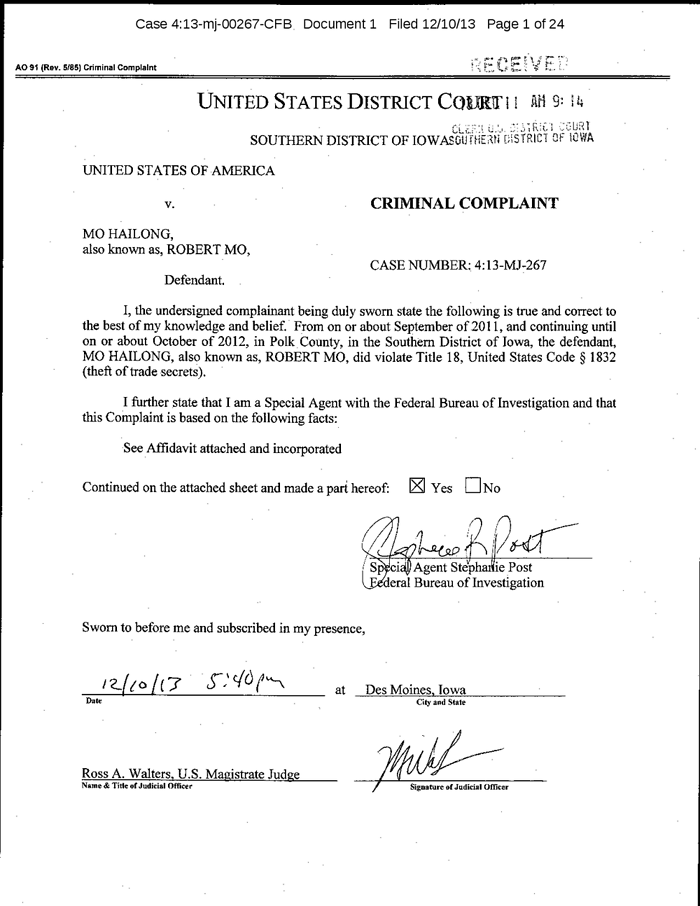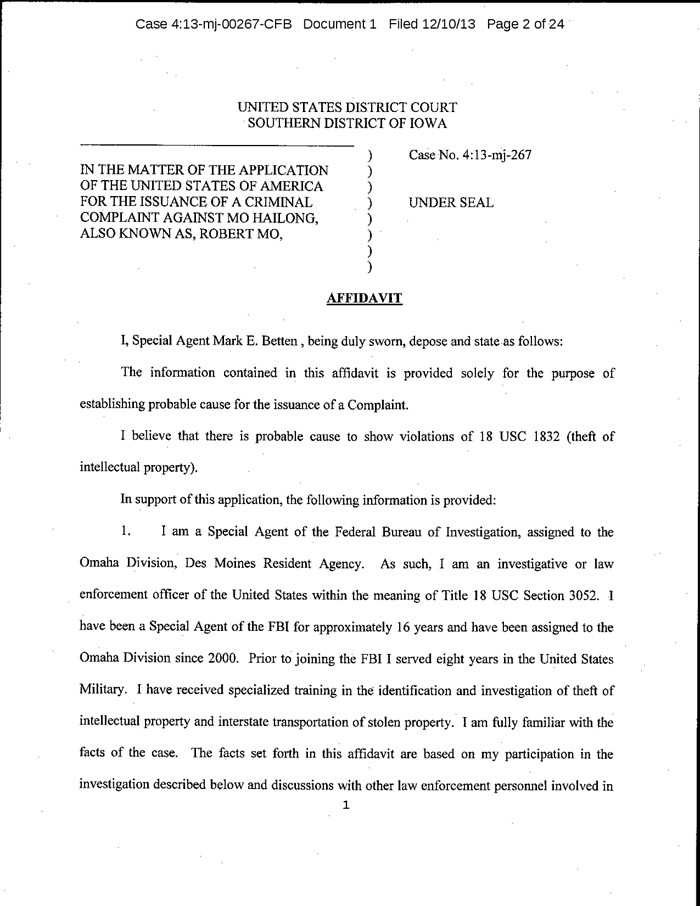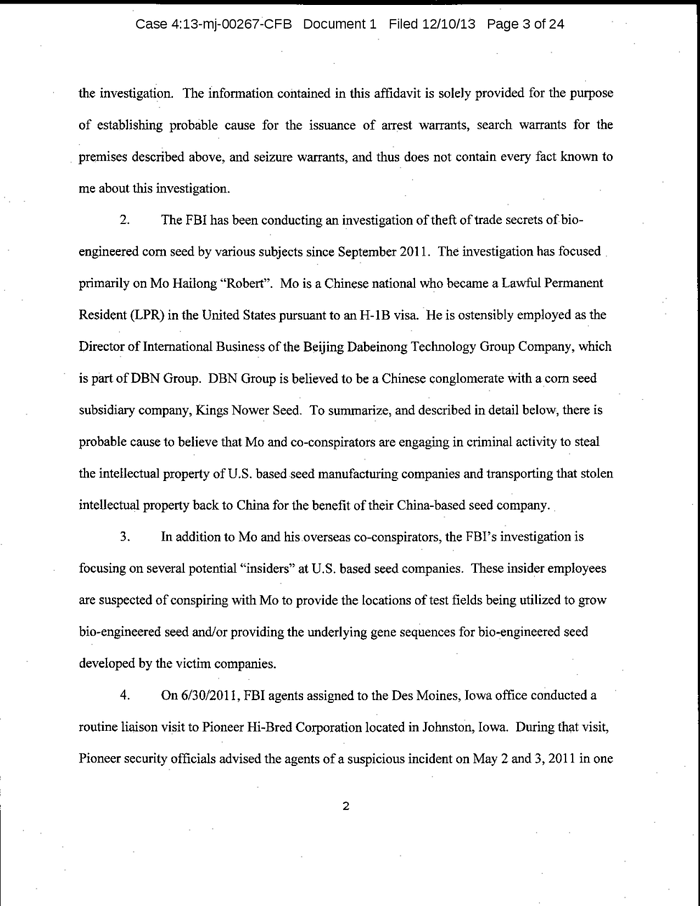Watch: Unraveling the great Chinese corn seed spy ring
As China and the U.S. wrangle over cyber espionage, an old-school spy ring was allegedly at work in Iowa's cornfields
When Chinese President Xi Jinping landed in Des Moines, Iowa, in February 2012, it was a triumphant return. He last visited the state 27 years before as an obscure provincial official on an agricultural trade mission. This time, he was greeted on the tarmac by the governor and his wife, who hosted a dinner that night in his honor.
At the dinner was another Chinese national, using an alias, who was on an agricultural mission of his own, according to the FBI. A seating chart from the dinner shows him at table 44, though other guests at the table reached by America Tonight remembered little about the man whose real name is Mo Hailong.
The FBI says he was part of a conspiracy to steal America's latest corn seed technology. Thanks to our blockbuster hybrids, American farmers produce on average almost twice as many corn bushels per acre as their Chinese counterparts. That leaves Chinese seed companies with just three options: years and years of gradual catch-up, licensing American seeds or stealing them.
Seeds of deceit
Mo, who also went by Robert Mo, lived in Boca Raton, Florida, and was director of international business for Dabeinong Technology Group (DBN Group), a $3 billion agricultural science and technology company. Mo has a graduate degree in mechanical engineering from Kansas State University, and had been a legal resident in the U.S. for a decade. Mo’s sister, Mo Yun, is married to DBN Group’s billionaire CEO, Shao Genhuo.
According to court documents, Mo and other Chinese nationals were crisscrossing Iowa and other farm belt states attempting to steal parent or inbred corn seeds bred painstakingly over years of trial and error by agriculture giants Monsanto, DuPont Pioneer and LG Seeds, and worth millions of dollars.
“We allege that they were here under a conspiracy to steal trade secrets from American companies,” Nicholas Klinefeldt, U.S. attorney for the Southern District of Iowa, told America Tonight. “The information that was stolen in this case has an estimated value of five to eight years worth of research time. And a minimum of $30 to $40 million.”
The hybrid seeds make corn plants that are resistant to pests, insects, drought and, in the United States, herbicides. They’re also bred for “standability,” which means the plant won't tip over in late summer when it's heavy with ears of corn.
But the Holy Grail is yield, according to Iowa State University agronomist Kendall Lamkey.
“You can’t play catch-up in plant breeding very easily,” Lamkey said. “For example, if I’m at a yield level of 200 bushels per acre and you’re at a yield level of 100 bushels per acre, closing that gap by plant breeding is going to be very difficult. You can’t make big leaps. It’s never been done.”
If companies don’t want to devote the time and money to developing their own seeds, they can license the technology from companies like Monsanto and Pioneer. But China isn't known for protecting companies’ intellectual property, Lamkey said, and American companies are reluctant to even let Chinese companies use their work.
The seed companies declined to talk about the case, citing the ongoing investigation. Mo’s attorneys also declined to speak with America Tonight.
Digging in the dirt

Mo first came to the attention of authorities in May 2011 when a Pioneer security guard caught him on his knees in an unmarked research field near Tama, Iowa, according to court documents. The field had been planted two days earlier. Confronted, a flushed and nervous Mo told the security guard that he was attending a conference before driving with his companion through a ditch in his haste to get away, according to the criminal complaint. The rental car’s license plate led authorities back to Mo.
Four months after his run-in at the Pioneer field, the Polk County Sheriff’s Department received a call about a man acting suspiciously in a cornfield in Bondurant, Iowa.
“Somebody made a 911 call,” said Lt. Jana Abens, a spokeswoman for the Polk County Sheriff’s Department. “The report was made that somebody was walking around in a farm field, which seemed unusual to the caller and to us also.”
Questioned by the deputy, Mo explained that the two men he was traveling with were from China, and that they were driving around the Midwest looking at crops. But these were no ordinary crops. The field was an unmarked Monsanto research field, according to court documents.
“It was at this time the FBI began their investigation,” Klinefeldt said.
Over the following two and a half years, FBI surveillance teams followed Mo and his alleged accomplices, tapped cellphone calls, planted audio recording devices in rental cars and set up a video camera over a storage unit, according to court documents.
Mo appeared to become worried that he was being followed. The criminal complaint against him says he drove slowly on the interstate for long stretches before “short bursts of high-speed driving.” In Adel, Iowa, where court documents said Mo had a storage unit, the FBI reported Mo making several U-turns and backing into a parking lot to observe passing traffic. He had reason to be concerned.
FBI surveillance teams were watching as Mo drove to Crossroads Ag, a farm supply store in Dallas Center, Iowa, and paid $1,533.72 in cash for six bags of Pioneer Hi-Bred corn seeds, according to the criminal complaint. One of every 200 seeds in a bag of hybrid corn seed is a parent seed, which can be discovered by planting the seeds and picking out the plants that are different. Kernels from the ears of these plants can be used to make hybrids.
Farmers who buy seeds are normally required to sign a growing agreement, governing how the seeds can be used, much like the way users license software. For example, the Pioneer Hi-Bred agreement states that the recipient agrees “not to use plants produced from the Seeds and Technology or their progeny for breeding purposes.” Mo bought the seeds but did not sign the agreement, according to the criminal complaint.
“There are several ways to steal this product. You can go out and steal it during planting season, and literally just dig it up out of the dirt – the seed. You can come back in the fall, get the ears of corn. You can steal it by buying a bag of corn seed without signing the requisite licensing agreement,” Klinefeldt said. “We allege that they were doing all of these.”
Popcorn kernels
In May 2012, Mo and two others went to FedEx location in Orland Park, Illinois, and allegedly attempted to send five boxes of seed, weighing a total of 125 pounds, to Hong Kong. FBI agents obtained a court order and intercepted the seeds at the FedEx hub in Memphis, Tennessee, according to the criminal complaint.
In September 2012, U.S. Customs and Border Patrol searched checked bags belonging to Li Shaoming and Ye Jian, chief operating officer and a research manager, respectively, at DBN Group subsidiary Kings Nower Seed Company. In two bulk-sized microwave popcorn boxes, beneath the popcorn packages, officials found 100 small, numbered manila envelopes containing corn seeds. In Ye’s checked luggage, they found more kernels of corn wrapped in napkins, according to the criminal complaint. He also allegedly had additional napkins with corn seed in his pockets.
The same day, agents at the U.S.-Canadian border were waiting for alleged co-conspirator Wang Hongwei when he pulled up to the Highgate Springs Port of Entry in Vermont. According to the complaint, a search of his car uncovered 44 bags of seeds under his seat and in his luggage.
In each of these cases, authorities seized the corn but made no arrests because of the continuing investigation, according to the U.S. Attorney's Office for Southern District of Iowa.
U.S. Marshals arrested Mo last December. His sister, Mo Yun, was arrested in July. They've been living in Des Moines under what amounts to house arrest. Five other alleged conspirators remain at large. The FBI is also “focusing on several potential ‘insiders’ at U.S. seed companies,” who tipped off Mo to the locations of the research fields, according to court documents.
Mo and his sister are scheduled to stand trial starting in December. If convicted, they face up to 10 years in prison and a $5 million fine. Asked for a comment as he headed into federal court for a hearing last week, Mo offered a wan smile and a wave but said nothing.
Klinefeldt, the U.S. attorney, said he’s not sure how many seeds made it to China.
“The worst-case scenario is in fact that they get away with it,” he said. “That companies like Pioneer and Monsanto and LG Seeds and the agriculture industry spend millions and millions of dollars and years developing these products and then are robbed of the benefits of their efforts.”





No comments:
Post a Comment
Comments always welcome!